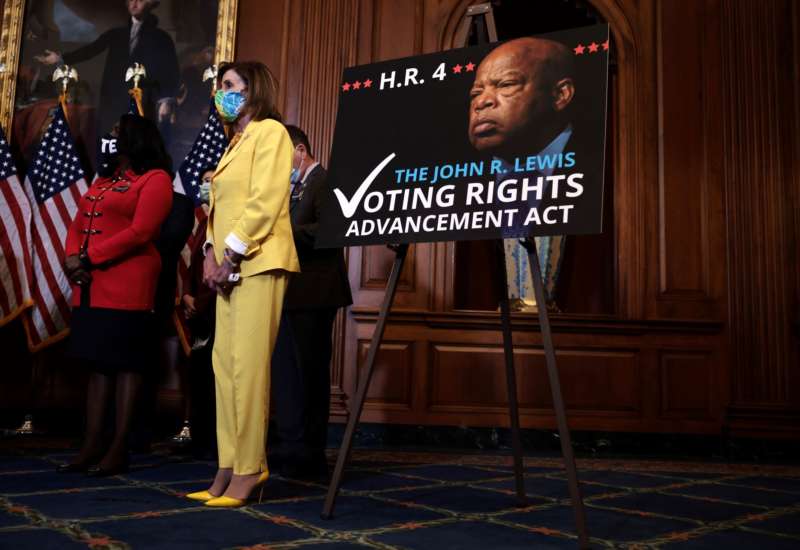The House passed the John Lewis Voting Rights Advancement Act on Tuesday evening. The bill would empower nonwhite voters and enable the federal government to move against racial discrimination in voting.
The bill, named for the late Rep. John Lewis, a Democrat from Georgia and civil rights advocate who died last year, passed the House 219 to 212 along party lines. It now goes to the Senate, where it stands an exceedingly slim chance of passing.
Democrats and progressives have been pushing for the bill’s passage for years. If signed into law, it would restore and strengthen a rule shot down by conservative Supreme Court justices in 2013 that weakened protections from the landmark 1965 Voting Rights Act. Previously, jurisdictions with a history of racial discrimination in voting had to gain approval from the Justice Department if they were seeking to change their election rules, a process called preclearance.
The Supreme Court shot down that part of the Voting Rights Act eight years ago when it ruled that the way that Congress was deciding which jurisdictions had to undergo preclearance was outdated. Law experts like Attorney General Merrick Garland argue that the original preclearance process was “enormously effective,” though the John Lewis Act would create updated rules for preclearance to fit with modern practices of discrimination.
The bill also addresses another Supreme Court decision from earlier this year, from Brnovich v. Democratic National Committee, that also severely weakened the section of the Voting Rights Act that limited states’ abilities to create racist voter suppression laws.
Voting rights advocates have lauded the bill for its potential to help tamp down racist voter suppression in the election process and stem the tide of voter suppression laws being passed by Republicans across the country.
But, partially because of that very potential, the bill stands a very low chance of gaining any Republican approval in the Senate, where it would need 60 votes to overcome a filibuster — the outdated practice that progressives have called for abolishing.
“The House passed the For the People Act AND the John Lewis Voting Rights Advancement Act,” said Rep. Pramila Jayapal (D-Washington) on Twitter. “We’re tackling the urgent voter suppression crisis happening across our nation. It’s time for the Senate to do the same. End the filibuster.”
Other lawmakers called for the full passage of the For the People Act, or H.R.1, on top of the John Lewis Act to continue upholding voting rights in the U.S.
“The House passed HR 4, the John Lewis Voting Rights Advancement Act — restoring key voting provisions undone by the Supreme Court,” tweeted Rep. Jamaal Bowman (D-New York). “But the work continues. And it must continue in the form of HR 1’s passage to bring about a new era in our multiracial democracy.”
Rep. Alexandria Ocasio-Cortez (D-New York) echoed that sentiment, saying “The House just passed HR 4, restoring the Voting Rights Act of 1965. But our work isn’t done. The Senate must also pass HR 1, which would enact automatic voter registration, vote-by-mail, and early voting in every state.”
Both H.R.1 and H.R.4, however, face opposition not only from Republicans but also from Democratic Sen. Joe Manchin (D-West Virginia), who has said that he is in favor of the John Lewis Act, but with caveats, which significantly weaken the bill. Manchin also said he is supportive of some parts of the For the People Act — but the parts he does not support happen to be the most significant ones, such as the campaign finance transparency proposals.


